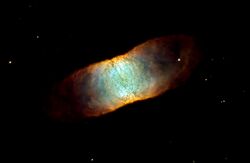Astronomy:IC 4406
| Emission nebula | |
|---|---|
| Planetary nebula | |
 Hubble Space Telescope view of IC 4406 | |
| Observation data: J2000 epoch | |
| Right ascension | 14h 22m 26.278s[1] |
| Declination | −44° 09′ 04.35″[1] |
| Distance | 2.0 kly (600 pc)[2] ly |
| Constellation | Lupus |
| Physical characteristics | |
| Absolute magnitude (V) | -0.3 |
| Notable features | - |
| Designations | Retina Nebula[3] |
IC 4406, sometimes known as the Retina Nebula,[4] is a planetary nebula near the western border of the constellation Lupus, the Wolf. It has dust clouds and has the shape of a torus. Despite this, it looks somewhat rectangular because it is seen from its side as viewed from Earth, almost in the plane[2] of its equator.
Structure
IC 4406 is bipolar and appears to be a prolate spheroid with strong concentrations of material in its equator.[3] This kind of structure is a natural product of a bipolar model.[3] The knots of IC 4406 have a "lacy" appearance and have no ordered symmetry towards the central star.[2] The knots have no tails.[2] None of the features have bright edges.[2] At least 5 faint ring-like structures, seen as arcs north and south of the main nebula, have been detected in Very Large Telescope observations.[5]
The central star of the planetary nebula has a spectral type similar to that of a Wolf–Rayet star.[6] An analysis of Gaia data suggests that it may be a binary system.[7]
Gallery
-
IC 4406 seen with MUSE instrument and the Adaptive Optics Facility.[8]
See also
References
- ↑ 1.0 1.1 "SIMBAD Astronomical Database". Results for IC 4406. http://simbad.u-strasbg.fr/Simbad.
- ↑ 2.0 2.1 2.2 2.3 2.4 O'dell, C. R.; Balick, B.; Hajian, A. R.; Henney, W. J.; Burkert, A. (2003). "Knots in Planetary Nebulae". in S. J. Arthur & W. J. Henney. Winds, Bubbles, and Explosions: a conference to honor John Dyson, Pátzcuaro, Michoacán, México, September 9–13, 2002. 15. pp. 29–33. Bibcode: 2003RMxAC..15...29O. http://www.astroscu.unam.mx/~rmaa/. Retrieved 2006-12-19.
- ↑ 3.0 3.1 3.2 O'Dell, C. R.; Balick, B.; Hajian, A. R.; Henney, W. J.; Burkert, A. (2002). "Knots in Nearby Planetary Nebulae". The Astronomical Journal 123 (6): 3329–3347. doi:10.1086/340726. Bibcode: 2002AJ....123.3329O.
- ↑ Chadwick, Stephen; Cooper, Ian (11 December 2012). Imaging the Southern Sky. Springer. p. 149. ISBN 978-1461447498.
- ↑ Ramos-Larios, G.; Toalá, J. A.; Rodríguez-González, J. B.; Guerrero, M. A.; Gómez-González, V. M. A. (June 2022). "Rings and arcs around evolved stars - III. Physical conditions of the ring-like structures in the planetary nebula IC 4406 revealed by MUSE". Monthly Notices of the Royal Astronomical Society 513 (2): 2862–2868. doi:10.1093/mnras/stac605. Bibcode: 2022MNRAS.513.2862R. https://ui.adsabs.harvard.edu/abs/2022MNRAS.513.2862R. Retrieved 3 June 2022.
- ↑ González-Santamaría, I.; Manteiga, M.; Manchado, A.; Ulla, A.; Dafonte, C.; López Varela, P. (2021). "Planetary nebulae in Gaia EDR3: Central star identification, properties, and binarity". Astronomy & Astrophysics 656: A51. doi:10.1051/0004-6361/202141916. Bibcode: 2021A&A...656A..51G.
- ↑ Chornay, N.; Walton, N. A.; Jones, D.; Boffin, H. M. J.; Rejkuba, M.; Wesson, R. (2021). "Towards a more complete sample of binary central stars of planetary nebulae with Gaia". Astronomy & Astrophysics 648: A95. doi:10.1051/0004-6361/202140288. Bibcode: 2021A&A...648A..95C.
- ↑ "Cutting-edge Adaptive Optics Facility Sees First Light - Spectacular improvement in the sharpness of MUSE images". https://www.eso.org/public/news/eso1724/.
External links
 |
![IC 4406 seen with MUSE instrument and the Adaptive Optics Facility.[8]](/wiki/images/thumb/f/f4/The_planetary_nebula_IC_4406_seen_with_MUSE_and_the_AOF.jpg/119px-The_planetary_nebula_IC_4406_seen_with_MUSE_and_the_AOF.jpg)
